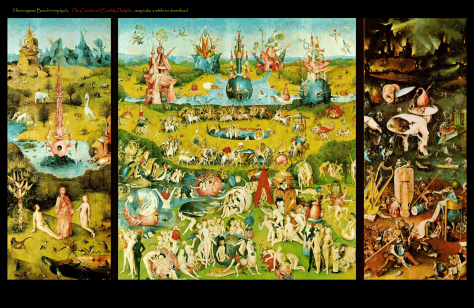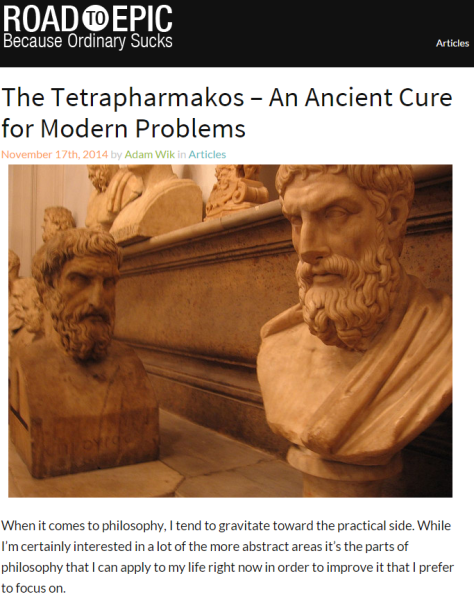O EPICURISMO E SUA CURA QUÁDRUPLA (Tetrapharmakos)
EPICURO – É POSSÍVEL OBTER PRAZER
Por Rafael Trindade, A Razão Inadequada
Epicuro é um raio de sol que atravessa toda uma nuvem espessa de superstição, medo e insegurança. Sua filosofia não se perde no meio do longo caminho que leva da tristeza do ignorante à sabedoria do filósofo. “É possível obter prazer” é o quarto e último remédio de seu tetrapharmakon, prova de que os filósofos podem ser felizes e realistas ao mesmo tempo.
Depois de neutralizar a cólera dos deuses (veja aqui), zombar da morte (veja aqui) e mostrar a possibilidade de suportar a dor (veja aqui), Epicuro nos mostra o caminho final: a possibilidade de obter prazer. Mas o que é o prazer?
Epicuro faz a distinção em três tipo: naturais necessários, naturais não necessários e não naturais não necessários. Claro, tudo é natureza, mas esta separação nos ajuda a entender que alguns prazeres vêm do corpo, nascem de nossa própria existência e outros são frutos de ilusões e nos são empurrados garganta abaixo.
- Naturais necessários: sem eles, a harmonia de nosso corpo se desfaz. Os desejos naturais e necessários permitem que o corpo continue afirmando-se na existência. Nós não os desejamos porque são bons, eles são bons porque os desejamos. Água, para não morrer de sede; comida para não morrer de fome; calor; para não morrer de frio.
- Naturais não necessários: são prazeres, mas não necessários no sentido em que excedem a simples manutenção da existência. Mais do que conservar-se a vida quer o prazer de viver, e ela pode obter isso através da natureza. Faz-se aqui a passagem da existência para uma estética da existência. Mais do que apenas comer, é possível criar a culinária, arte de cozinhar. Mais do que ver, e ouvir, é possível pintar e fazer música, arte das cores e dos sons.
- Não naturais e não necessários: entramos no terreno das ilusões e da superstição. Aqui nascem os deuses e os demônios. Desejos não naturais e não necessários são aqueles que se descolam cada vez mais da terra e atingem reinos que não existem. Dinheiro, nosso novo deus, fama, glória, santidade. Curtidas no facebook, por que não? Estes objetos são vazios, alienam, nos impedem de atingir uma vida natural e de prazeres. Enfim, causam mais aflição que prazer, o dispêndio de energia para obtê-los não vale o que nos trazem em retorno. Copos sempre meio vazios, estas ilusões são a cenoura na frente do burro, elas conduzem a humanidade em sua longa marcha irracional…
Não precisamos temer os deuses nem a morte, é possível suportar a dor e mais, é possível obter prazer. Como? Para criar estas quatro lições, Epicuro só teve que tomar uma atitude simples, ouvir seu corpo, fazê-lo pensar, obrigá-lo a tomar certas posições em relação a certos problemas. Quando meu corpo está vivo, eu não estou morto, então não preciso me preocupar. Quando sinto dor, posso suportá-la e usá-la para melhor agir no mundo. Quando escuto o que meu corpo tem a dizer, aprendo a selecionar os melhores prazeres. A única felicidade maior que ouvir as lições de Epicuro é segui-las.
EPICURO – DO BOM USO DA DOR
Por Rafael Trindade, A Razão Inadequada
Quando Epicuro diz que é possível suportar a dor, cai em um realismo no qual poucos conduziram-se. Sim, há dor, ela existe no mundo, está para além da teodiceia, os deuses indolentes não estão preocupados com nosso grau de sofrimento. O que fazer com a dor? Antes de mais nada, vemos uma proposição negativa: não é possível negá-la, segundo: é possível suportá-la.
Não há pecado original, não há complexo de Édipo, não há más energias dos astros… simplesmente o mundo é feito de prazeres e dores; e para viver nele, é preciso saber procurar o prazer e evitar a dor. Epicuro submete a dor à sabedoria do tetrapharmakon, negá-la seria inútil, então procura entendê-la para melhor lidar com ela.
A dor é um desarranjo atômico, ela indica que algo está fora do lugar, há uma desarmonia no corpo, simplesmente algo está errado. É preciso entender que a dor é um sinal do corpo para que tome uma atitude, aja. “Tire a mão do fogo“, diz a dor, “Não coma mais isso“, diz o desconforto, “Não relacione-se mais com ele“, diz a tristeza. O sábio não rejeita a dor, ele a recebe de braços abertos, mas atento, precavido, preparado para ouvir seu recado e lidar com os encargos que a dor exige.
Deixamos finalmente o terreno neurótico do certo e do errado, do bem e do mal, e atingimos uma planície filosófica, povoada de, como diz Espinosa, bons e maus encontros. Epicuro não julga nem condena, ele mede os afetos, ele os coloca à sua disposição.
Submeter a dor, sujeitá-la à filosofia, fazer dela uma parte da sabedoria. “Aquilo que não me mata, me torna mais forte” disse Nietzsche, imbuído do espírito epicurista em Crepúsculo dos Ídolos. Este remédio me leva a ter uma relação ética com a dor, como lidar com ela? Em vez de carregar a minha dor como fardo, será que posso utilizá-la como ferramenta? Grandes pensamentos nascem da dor, sua superação é um momento grandioso.
Suportar a dor, não negá-la, não ignorá-la, não jogar para debaixo do tapete, não se utilizar apenas de narcóticos e entorpecentes. Encarar a dor, enfrentá-la, tratá-la com respeito. O sábio Epicuro, em sua busca do prazer, reservou um lugar para a dor, talvez por isso seu tetrapharmakon seja tão eficaz.
* * * * *
The Tetrapharmakos – An Ancient Cure for Modern Problems
November 17th, 2014 by Adam Wik
When it comes to philosophy, I tend to gravitate toward the practical side. While I’m certainly interested in a lot of the more abstract areas it’s the parts of philosophy that I can apply to my life right now in order to improve it that I prefer to focus on.
To that end one piece of the Epicurean school that I think has added a lot to my daily life, or at least my attitudes toward it, is the Tetrapharmakos. Even though it was originally created in the 2nd or 3rd century BCE, the ideas it puts forth are just as applicable today.
What’s the Tetrapharmakos?
The Tetrapharmakos originally referred to a certain combination of ‘medicines’ (wax, pitch, tallow, and resin – not something I’d recommend trying) common in ancient Greek pharmacology. The word means ‘four part drug / cure’ in Greek, and Epicurus took that name for his philosophical version considering it to be a four part cure for healing a person’s emotional maladies instead of their physical ones.
Epicurus’s Tetrapharmakos consists of these four (slightly paraphrased) points:
- Don’t fear gods.
- Don’t fear death.
- Truly good things are easy to get.
- Truly bad things don’t last.
Let’s go through these points and take a look at how they’re still applicable today.
Don’t Fear Gods
In Epicurus’s time there was a societal division between Greeks who saw the gods as being literal beings that concerned themselves with the affairs of mortals and those (like Epicurus) who considered the gods to be more abstract concepts describing a state of bliss completely unconcerned with the affairs of humans. His essential argument was that gods are by definition perfect, and a perfect being isn’t going to care if you sacrificed a goat in its temple this week or not.
As noted in my personal philosophy I remain unconvinced there are any gods, or anything supernatural for that matter, in existence. I also remain unconvinced I (or anyone/anything else) has a soul, spirit, or whatever ill-defined word you want to use for that concept.
Why is this important? While it doesn’t always, belief in gods can cause a lot of harm. Furthermore the fear of gods specifically, and the fear of punishment by those gods after death can cause enough psychological harm in people that there are specific organizations out there to help people recover from that damage.
Epicurus believed one of the biggest obstacles to happiness was anxiety, and fear of gods and eternal punishment is a huge source of anxiety in people. Here in the U.S. where Christianity is most prevalent fear of punishment in Hell, both of the individual and their loved ones, can cause real stress. When you realize there’s absolutely no evidence that any of those things are real and that they probably don’t exist, it makes it easy to let go of that fear. It also helps set up the next point.
Don’t Fear Death
It’s part of the human condition to fear death. It’s probably one of the most ever-present and strongest anxieties of all for most people. Obviously for Epicurus, this was a problem since he considered fear and anxiety the biggest obstacle to finding happiness.
Epicurus’s position was that there’s no reason to worry so much about death because when we’re alive death isn’t here yet, and when death comes we no longer exist to experience it. To put it another way reminiscent of something Mark Twain would say centuries later, there can be no ‘unpleasantness’ to non-existence because you have to exist to experience something unpleasant. In the same way that you have no experience of anything before birth, you’ll have no experience of anything after death.
Being dead will be just like the state you were in during the billions of years that came before your birth – non-experiencing non-existence.
We’ve already established that there’s no evidence for any kind of afterlife or existence past death, no punishment or eternal torment to worry about, so there’s nothing there to be worried about.
Why is this important? Being in a state of constant worry about what’s going to happen to you after death can cause all the same kinds of crippling anxiety as the belief in gods we talked about above can. It’s an ever-present, background fear in a lot of people and that directly detracts from their happiness and quality of life. Letting go of this fear makes it easier to be happy.
Does that mean you should be reckless or want to die? Absolutely not. There is definitely harm in death in most cases, even if it’s not to you directly (missed opportunity to do good, emotional or financial harm caused to friends and family, etc.), so seeking death is still generally a bad thing. It just means that there’s no reason to live in constant fear of it. Don’t let the fear of something that is inevitable and not unpleasant in the long term ruin your life and cause actualunpleasantness now.
Truly Good Things Are Easy to Get
Mimicking (and possibly influenced by, though I’m unsure of any evidence supporting it) some of the ideas of Buddhism put forth between the 6th and 4th centuries BCE Epicurus asserted that excessive desires led to more harm than good. By extension of this he claimed the things that are truly ‘good’, those things that will truly make a person happy, are all easy to acquire regardless of your situation.
In general, I agree with this idea. As long as a person keeps their desires in check it’s relatively easy to fulfill the range of Maslow’s hierarchy of needs. Basic shelter, safety, companionship, and self-expression can all be had for relatively little effort by a majority of people.
I will put in a caveat here though that in modern times (and likely even back then, but Epicurus may not have been aware enough of it) situational and economic disparity can make it harder for people to get even the basics they need. I recognize having been born a white male in a middle class family there are certain things I’m susceptible to taking for granted. Accounting for that, there’s still things to gain from this idea.
The first is that your most basic needs, things like food and shelter, are technicallyeasy to get. Now some might take this the wrong way and think the point is that even if you’re living in a cardboard box under a bridge you should be happy with it. I don’t see it that way. To me it’s a dual reminder both to not stress out over the fear of losing material things and to always hold a yardstick to the things I really desire to make sure they’re really important.
Some things are genuinely worth putting a lot of effort into, but it’s easy to stress out over meaningless things unintentionally. Reminding yourself that most truly good things are easy to get also helps encourage you to find peace with what youdo have even if it’s less than what you’re striving for.
Truly Bad Things Don’t Last
This too shall pass.
In general, seriously terrible things tend to be acute whereas the chronic bad is often milder by comparison. This, Epicurus suggested, meant that you shouldn’t fear terrible things happening because they’ll always pass. On the inverse, things that don’t show signs of passing for a long time are likely things which you can find the strength to bear.
Don’t misunderstand this to think Epicurus was suggesting everything gets better in what would likely be the modern sense of the idea. Sometimes the end to that terrible suffering is death. Again, with no afterlife though there’s no need to worry about additional suffering after death – just impartial non-existence. That’s probably not the most comforting thing to everyone, but personally whenever something bad happens it’s always a comfort to me knowing that it won’t last. Recognizing that in a (relatively) short span of time you and everything and everyone you’ve known will be gone makes it easy to let go, and once you let go and stop being bothered by things they tend to get easier to handle.
These four principles probably aren’t going to solve every philosophical or existential problem you’re going to struggle with in your lifetime. Hell, it might not solve any of them, but I know I’ve found a lot of good in them when applied to my attitudes toward life in general. I encourage you to take whatever’s useful and don’t worry about the rest.
* * * * *
TETRAPHARMAKOS
Cura Quádrupla
-
- Don’t fear god (aphobon o theos)
- Don’t worry about death (anypopton o thanatos)
- What is good is easy to get (and kai tagathon men eyktêton)
- What is terrible is easy to endure (to de deinon eyekkarterêton)
(Inwood and Gerson 1994|tr.)
(Philodemus, PHerc. 1005, 4.9-14)
Publicado em: 24/05/15
De autoria: casadevidro247







